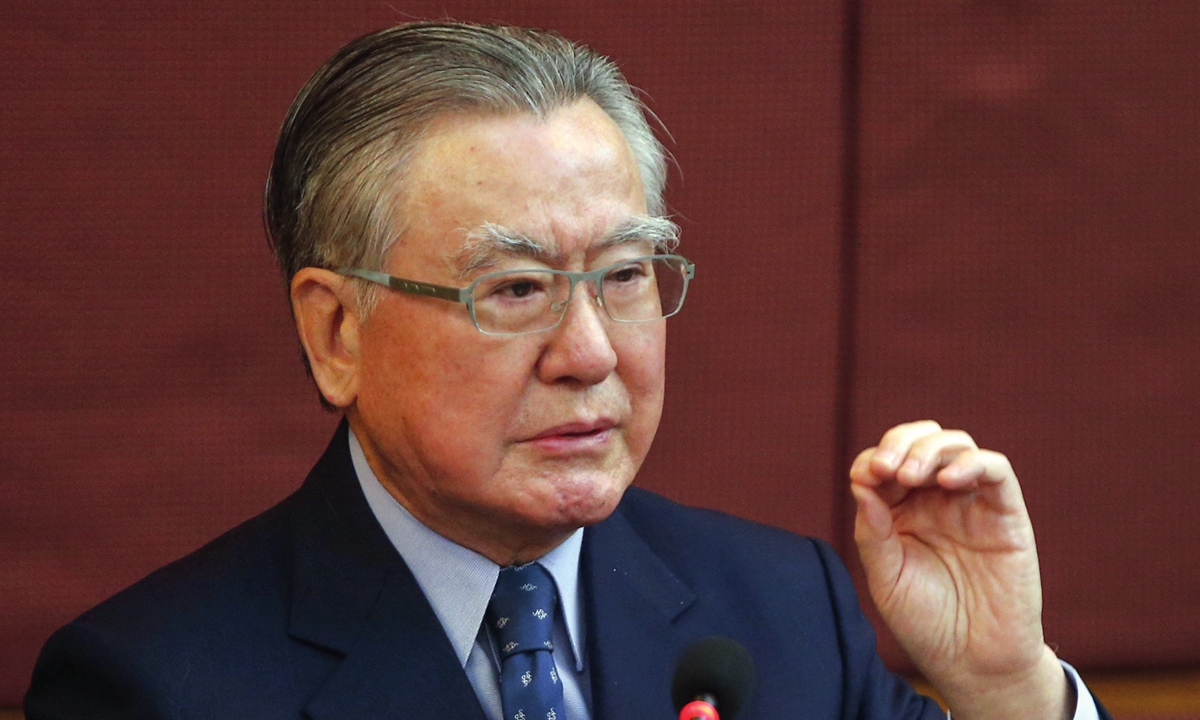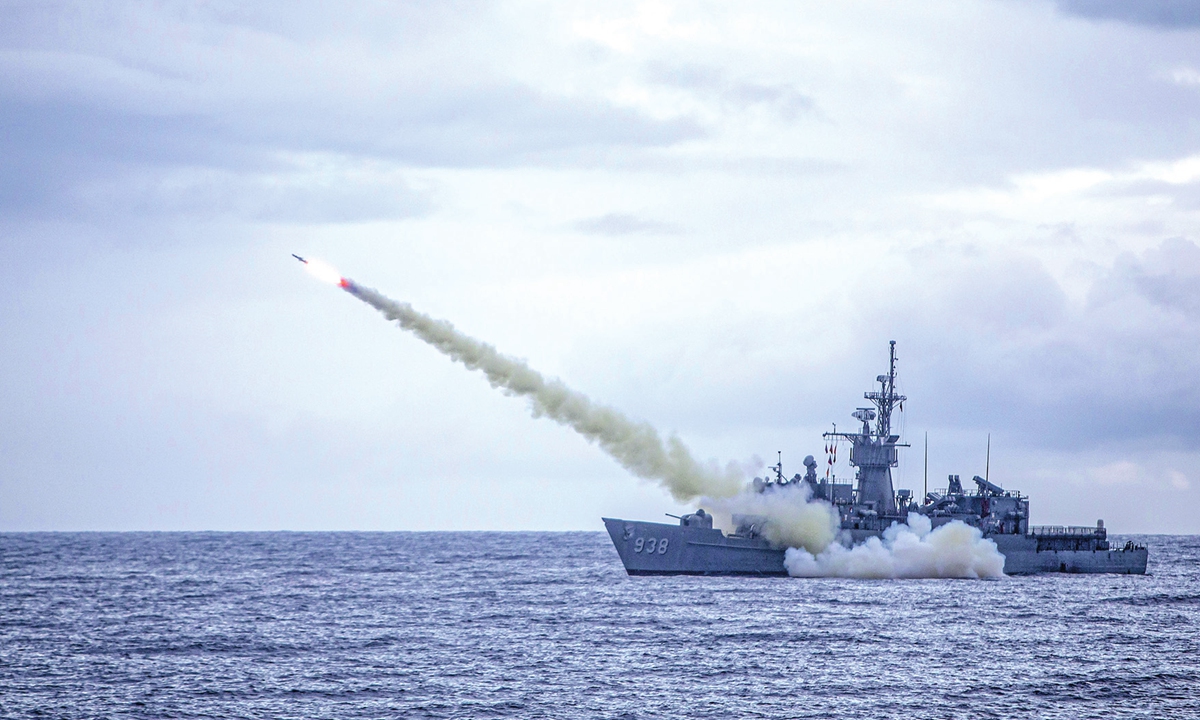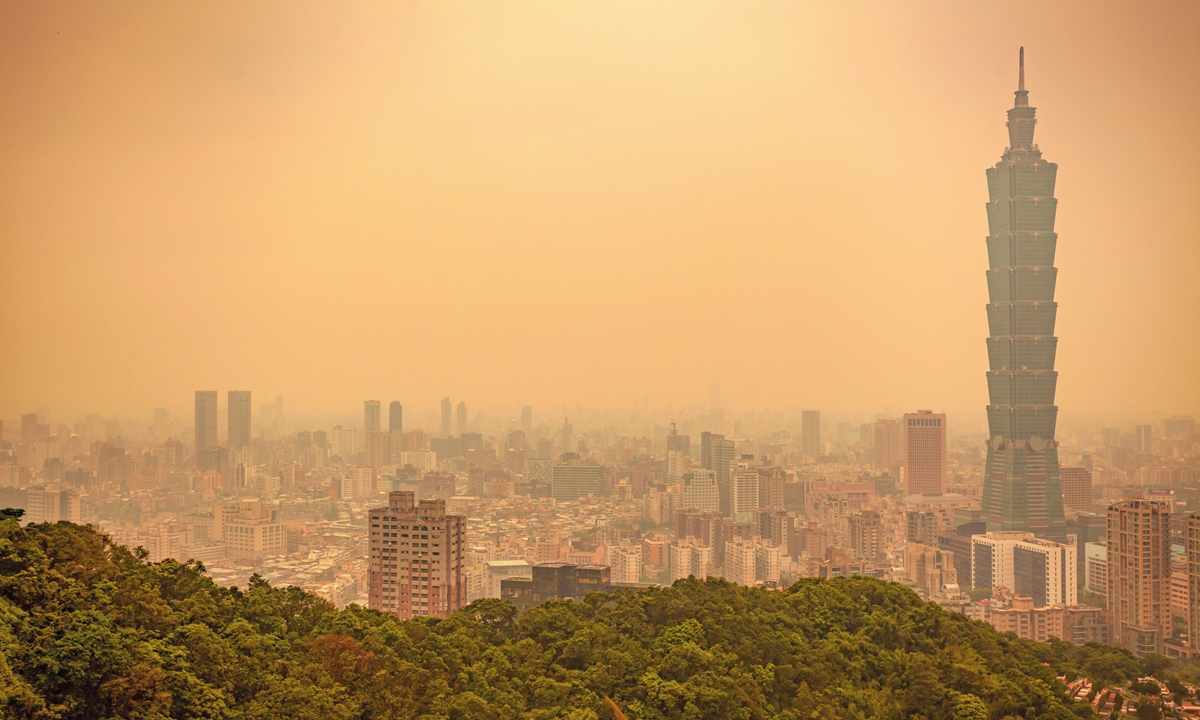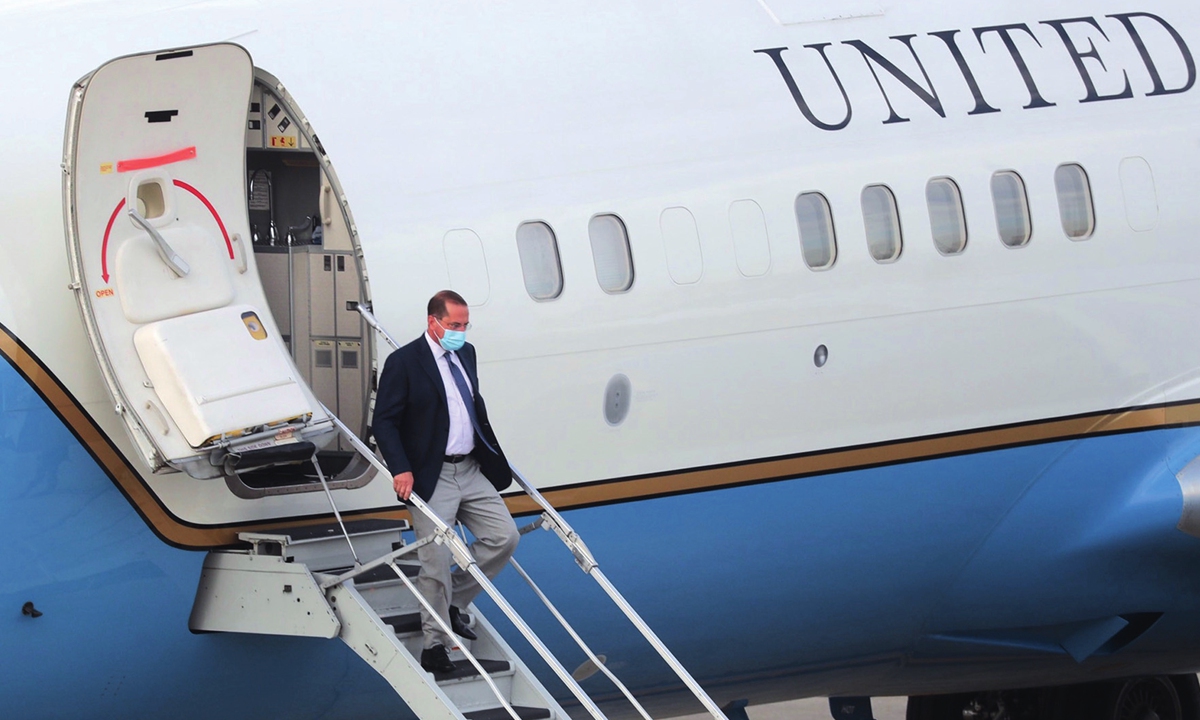US sets Taiwan up as a 'human bomb': former vice chairman of Straits Exchange Foundation
By Bai Yunyi Source: Global Times Published: 2020/9/8 19:08:40
Editor's note:
From continuing to approve arms sales to Taiwan, to high-level officials visiting Taiwan, to sending warships and aircraft near the island, the US government frequently played the "Taiwan card" to hinder peace of the Taiwan Straits. Many are worried about the chances the Taiwan Straits will become the tipping point of a military conflict between China and the US.
Dubbed a "chess piece" in the game, Taiwan's Democratic Progressive Party (DPP) authorities have closely followed the US, seemingly oblivious to the threat of a war.
Regarding current tensions, the Global Times reporter Bai Yunyi (GT) recently interviewed Chiu Chin-yi, former vice chairman of the Straits Exchange Foundation (SEF). Chiu, 83, was one of the main forces in Taiwan's negotiations for the "Wang-Koo talks" in 1992, leading to a consensus in cross-Straits relations.

Worse than 1996 crisis
GT: You said in a recent interview the current situation in the Taiwan Straits is more serious and dangerous than the 1996 Taiwan Straits Crisis. What did you mean?
Chiu: If the situation in the Taiwan Straits is compared to a poker game, in 1996 it was the Chinese mainland and Taiwan that played the cards and the US was initially a bystander. While the US later sent two aircraft carrier groups to the Far East to help Taiwan, it was still the Chinese mainland and Taiwan that played the cards. But the situation in 2020 is quite different from that time. Now it is the US playing its cards and the Chinese mainland responding to its cards, while Taiwan is a "human bomb" rushing forward regardless of costs.
After Tsai Ing-wen's inaugural speech in 2016, which the mainland considered as an "unfinished answer sheet," the official cross-Straits exchanges were almost suspended and Taiwan authorities [were] increasingly looking to the US for support. On the US side, after Trump took office, he did things in a way that often went against the rules which almost disturbed the entire existing international order. Over the past four years, the Trump administration has increasingly positioned China as a strategic competitor, aiming to contain China's rise. Therefore, when the Washington counts its bargaining chips against Beijing and Taiwan shows its desire to seek America's embrace, the Americans take it over gladly to play the "Taiwan card."
That's why I said that the current situation is that Taiwan has been tied up as a "human bomb" by the US. The US now tests the mainland's strategic determination together with the Taiwan. Under the current situation, the two sides facing each other are the two "nuclear powers," which are different from the rivalry between the mainland and Taiwan. Therefore, the situation is much more dangerous and difficult to control than in the past.
'October surprise'
GT: Many analysts say the possibility of a regional armed conflict between China and the US cannot be ruled out. Do you predict an escalation of tensions? If there is a conflict, what will it mean for East Asia?
Chiu: My view is that the presidential election in the US is so intense right now that many scholars think Donald Trump would possibly stage an "October surprise." As far as the current situation is concerned, his "October surprise" is most likely to create some kind of armed conflicts to arouse American people's patriotism.
On the Korean Peninsula, the US is unlikely to do much now. In the South China Sea, it is too large for the US to make it a "war zone." But the Taiwan Straits seems to be a good option to the US. It can upset the mainland, but not cost the US a high price. After all, only the lives of Taiwan people will be sacrificed. That's why the US would put Taiwan on the front line as a "human bomb" to provoke the mainland. So this October is very dangerous.
From the mainland's perspective, it must hope that the first battle will be the last. But the reality may be more complicated, and it may not be that easy. However, if the mainland fails to make "the first war as the last," the situation would evolve to a point where immediate reunification cannot be achieved while there's no turning back in cross-Straits relations. In addition, the US will use this as an excuse to form anti-China coalitions in Asia, such as building an "Asian version of NATO."
As a person who cares about cross-Straits relations, my personal advice is that both sides must not follow the steps of the "political maniac" like Trump. The mainland, for its part, should wait and decide its future strategy after the US election. This is also a test of the mainland's strategic focus.

Chiu: There are already many signs: the joint military exercises between the US and the island of Taiwan; the US has decided to sell heavy drones and strike missiles to Taiwan. These are all signs of crossing a red line. If the US is determined to contain China's rise, the most ruthless move is to restore the status before 1979, which is to re-sign the defense treaty with Taiwan and include it in the "Asian version of NATO," or ask Taiwan's Kaohsiung and Keelung to be the ports of call for the US Seventh Fleet, or use Hualien as a base for US heavy bombers. The current situation showed that these possibilities should not be ruled out.
Therefore, how to prevent the further deterioration of cross-Straits relations, and how to pull the island of Taiwan out of the embrace and the influence of the US, is a very important issue.
GT: How to break Taiwan away from US influence?
Chiu: As I said before, Taiwan has been tied up as a "human bomb." So, Taiwan itself should do something to "defuse the bomb," and the mainland should also help Taiwan to "remove the bomb."
I always believe that economy is the main principle, and Taiwan always needs economy to survive and the fact is that Taiwan enjoys a surplus of nearly $100 billion with the mainland every year. Based on my previous experience of negotiating with the mainland, it was never the case that if you make a step further then I take a step back. Goodwill must be accumulated by both sides. Perhaps in the current situation, a small step that we take may become a big step.

Chiu: As a person who has studied international politics for many years, I think it is absolutely impossible for the US to truly "befriend Taiwan" or "protect Taiwan." How could the Americans sacrifice the lives of their soldiers and spend a large amount of money in order to protect Taiwan people? But now as Washington has clearly regarded Beijing as a strategic competitor, and the Taiwan authorities threw themselves to the embrace of the US, it can be noticed that in every opinion poll on the island, 60 to 70 percent of people believe that the US will protect Taiwan. It's really ridiculous.
On the other hand, I think Trump's analogy does not appropriately describe US strategy. Taiwan's strategic position is not just a "pen tip." From a strategic point of view, the US has always regarded Taiwan's position very seriously in the First island chain. If the US fleet and bombers have docking bases in Taiwan, the strategic situation in Asia will also change.
So I have been calling on the mainland government and experts to attach importance to Taiwan's strategic position. In order to realize the great rejuvenation of the Chinese nation, Taiwan is a place that must be acquired.
Vaccine cooperation
GT: The COVID-19 pandemic has worsened tensions across the Straits. The international community has used the scientific name of the virus. But many people and media in Taiwan insist on using "Wuhan pneumonia." Some students from the mainland were discriminated in Taiwan. How do you view the situation?
Chiu: In Taiwan, those who still say "Wuhan pneumonia" are either the radical ones, or those who promote the ideology. They never consider improving cross-Straits relations or solving problems with humanitarianism. Actually, whether we talk about "Xiaoming" (children of mainland-Taiwan couples left in the mainland because of the unfair entry ban of the Taiwan authority) or the mainland students, they are all friends and relatives to the Taiwan people. Why aren't they allowed to return to Taiwan?

I do not think much attention should be paid to those people's speeches. We should think in a positive way: COVID-19 is a plague that both sides of the Straits are facing. Can we improve the cross-Straits cooperation through sharing vaccines? When a group of Taiwan people still say "Wuhan pneumonia" with a narrowed mind, the mainland has shown willingness to work with the island on vaccine development.
This is a broad mindset shown to the Taiwan people and the world. Especially when Alex Azar, the US Health and Human Services Secretary, visited Taiwan, he only pushed Taiwan to import pork and beef from the US, but remained silent on vaccines. The comparison is obvious.
Of course, I know that the mainland also has difficulties. But under such a circumstance, doing this (vaccine cooperation) would not lose anything, but earn the mainland a good reputation among the Taiwan people. In turn, they would urge the DPP to change their policies.
Newspaper headline: Cross-Straits at crossroads
From continuing to approve arms sales to Taiwan, to high-level officials visiting Taiwan, to sending warships and aircraft near the island, the US government frequently played the "Taiwan card" to hinder peace of the Taiwan Straits. Many are worried about the chances the Taiwan Straits will become the tipping point of a military conflict between China and the US.
Dubbed a "chess piece" in the game, Taiwan's Democratic Progressive Party (DPP) authorities have closely followed the US, seemingly oblivious to the threat of a war.
Regarding current tensions, the Global Times reporter Bai Yunyi (GT) recently interviewed Chiu Chin-yi, former vice chairman of the Straits Exchange Foundation (SEF). Chiu, 83, was one of the main forces in Taiwan's negotiations for the "Wang-Koo talks" in 1992, leading to a consensus in cross-Straits relations.

Chiu Chin-yi, former vice chairman of the Straits Exchange Foundation Photo: cnsphotos
Worse than 1996 crisis
GT: You said in a recent interview the current situation in the Taiwan Straits is more serious and dangerous than the 1996 Taiwan Straits Crisis. What did you mean?
Chiu: If the situation in the Taiwan Straits is compared to a poker game, in 1996 it was the Chinese mainland and Taiwan that played the cards and the US was initially a bystander. While the US later sent two aircraft carrier groups to the Far East to help Taiwan, it was still the Chinese mainland and Taiwan that played the cards. But the situation in 2020 is quite different from that time. Now it is the US playing its cards and the Chinese mainland responding to its cards, while Taiwan is a "human bomb" rushing forward regardless of costs.
After Tsai Ing-wen's inaugural speech in 2016, which the mainland considered as an "unfinished answer sheet," the official cross-Straits exchanges were almost suspended and Taiwan authorities [were] increasingly looking to the US for support. On the US side, after Trump took office, he did things in a way that often went against the rules which almost disturbed the entire existing international order. Over the past four years, the Trump administration has increasingly positioned China as a strategic competitor, aiming to contain China's rise. Therefore, when the Washington counts its bargaining chips against Beijing and Taiwan shows its desire to seek America's embrace, the Americans take it over gladly to play the "Taiwan card."
That's why I said that the current situation is that Taiwan has been tied up as a "human bomb" by the US. The US now tests the mainland's strategic determination together with the Taiwan. Under the current situation, the two sides facing each other are the two "nuclear powers," which are different from the rivalry between the mainland and Taiwan. Therefore, the situation is much more dangerous and difficult to control than in the past.
'October surprise'
GT: Many analysts say the possibility of a regional armed conflict between China and the US cannot be ruled out. Do you predict an escalation of tensions? If there is a conflict, what will it mean for East Asia?
Chiu: My view is that the presidential election in the US is so intense right now that many scholars think Donald Trump would possibly stage an "October surprise." As far as the current situation is concerned, his "October surprise" is most likely to create some kind of armed conflicts to arouse American people's patriotism.
On the Korean Peninsula, the US is unlikely to do much now. In the South China Sea, it is too large for the US to make it a "war zone." But the Taiwan Straits seems to be a good option to the US. It can upset the mainland, but not cost the US a high price. After all, only the lives of Taiwan people will be sacrificed. That's why the US would put Taiwan on the front line as a "human bomb" to provoke the mainland. So this October is very dangerous.
From the mainland's perspective, it must hope that the first battle will be the last. But the reality may be more complicated, and it may not be that easy. However, if the mainland fails to make "the first war as the last," the situation would evolve to a point where immediate reunification cannot be achieved while there's no turning back in cross-Straits relations. In addition, the US will use this as an excuse to form anti-China coalitions in Asia, such as building an "Asian version of NATO."
As a person who cares about cross-Straits relations, my personal advice is that both sides must not follow the steps of the "political maniac" like Trump. The mainland, for its part, should wait and decide its future strategy after the US election. This is also a test of the mainland's strategic focus.

A Taiwan warship launches a US-made Harpoon missile during the annual "Han Kuang" military drill on July 15, 2020. Photo: AFP
GT: You have mentioned that if a US warship enters a Taiwan port, it will step on "one of the [mainland's] last bottom lines." Have any recent moves by the US and the island of Taiwan come close to Beijing's "red line"?Chiu: There are already many signs: the joint military exercises between the US and the island of Taiwan; the US has decided to sell heavy drones and strike missiles to Taiwan. These are all signs of crossing a red line. If the US is determined to contain China's rise, the most ruthless move is to restore the status before 1979, which is to re-sign the defense treaty with Taiwan and include it in the "Asian version of NATO," or ask Taiwan's Kaohsiung and Keelung to be the ports of call for the US Seventh Fleet, or use Hualien as a base for US heavy bombers. The current situation showed that these possibilities should not be ruled out.
Therefore, how to prevent the further deterioration of cross-Straits relations, and how to pull the island of Taiwan out of the embrace and the influence of the US, is a very important issue.
GT: How to break Taiwan away from US influence?
Chiu: As I said before, Taiwan has been tied up as a "human bomb." So, Taiwan itself should do something to "defuse the bomb," and the mainland should also help Taiwan to "remove the bomb."
I always believe that economy is the main principle, and Taiwan always needs economy to survive and the fact is that Taiwan enjoys a surplus of nearly $100 billion with the mainland every year. Based on my previous experience of negotiating with the mainland, it was never the case that if you make a step further then I take a step back. Goodwill must be accumulated by both sides. Perhaps in the current situation, a small step that we take may become a big step.

A view of Taipei Photo: IC
GT: Former National Security Adviser John Bolton stated in his new book that Trump once compared Taiwan and the mainland to a "pen tip" and a "desk" respectively. How does the island view the alleged US attitude toward Taiwan? Do you believe the US will truly "befriend Taiwan" and "protect Taiwan"?Chiu: As a person who has studied international politics for many years, I think it is absolutely impossible for the US to truly "befriend Taiwan" or "protect Taiwan." How could the Americans sacrifice the lives of their soldiers and spend a large amount of money in order to protect Taiwan people? But now as Washington has clearly regarded Beijing as a strategic competitor, and the Taiwan authorities threw themselves to the embrace of the US, it can be noticed that in every opinion poll on the island, 60 to 70 percent of people believe that the US will protect Taiwan. It's really ridiculous.
On the other hand, I think Trump's analogy does not appropriately describe US strategy. Taiwan's strategic position is not just a "pen tip." From a strategic point of view, the US has always regarded Taiwan's position very seriously in the First island chain. If the US fleet and bombers have docking bases in Taiwan, the strategic situation in Asia will also change.
So I have been calling on the mainland government and experts to attach importance to Taiwan's strategic position. In order to realize the great rejuvenation of the Chinese nation, Taiwan is a place that must be acquired.
Vaccine cooperation
GT: The COVID-19 pandemic has worsened tensions across the Straits. The international community has used the scientific name of the virus. But many people and media in Taiwan insist on using "Wuhan pneumonia." Some students from the mainland were discriminated in Taiwan. How do you view the situation?
Chiu: In Taiwan, those who still say "Wuhan pneumonia" are either the radical ones, or those who promote the ideology. They never consider improving cross-Straits relations or solving problems with humanitarianism. Actually, whether we talk about "Xiaoming" (children of mainland-Taiwan couples left in the mainland because of the unfair entry ban of the Taiwan authority) or the mainland students, they are all friends and relatives to the Taiwan people. Why aren't they allowed to return to Taiwan?

US Health Secretary Alex Azar walks out of a plane as he arrives at the Sungshan Airport in Taipei on August 9, 2020. Photo: AFP
I do not think much attention should be paid to those people's speeches. We should think in a positive way: COVID-19 is a plague that both sides of the Straits are facing. Can we improve the cross-Straits cooperation through sharing vaccines? When a group of Taiwan people still say "Wuhan pneumonia" with a narrowed mind, the mainland has shown willingness to work with the island on vaccine development.
This is a broad mindset shown to the Taiwan people and the world. Especially when Alex Azar, the US Health and Human Services Secretary, visited Taiwan, he only pushed Taiwan to import pork and beef from the US, but remained silent on vaccines. The comparison is obvious.
Of course, I know that the mainland also has difficulties. But under such a circumstance, doing this (vaccine cooperation) would not lose anything, but earn the mainland a good reputation among the Taiwan people. In turn, they would urge the DPP to change their policies.
Newspaper headline: Cross-Straits at crossroads